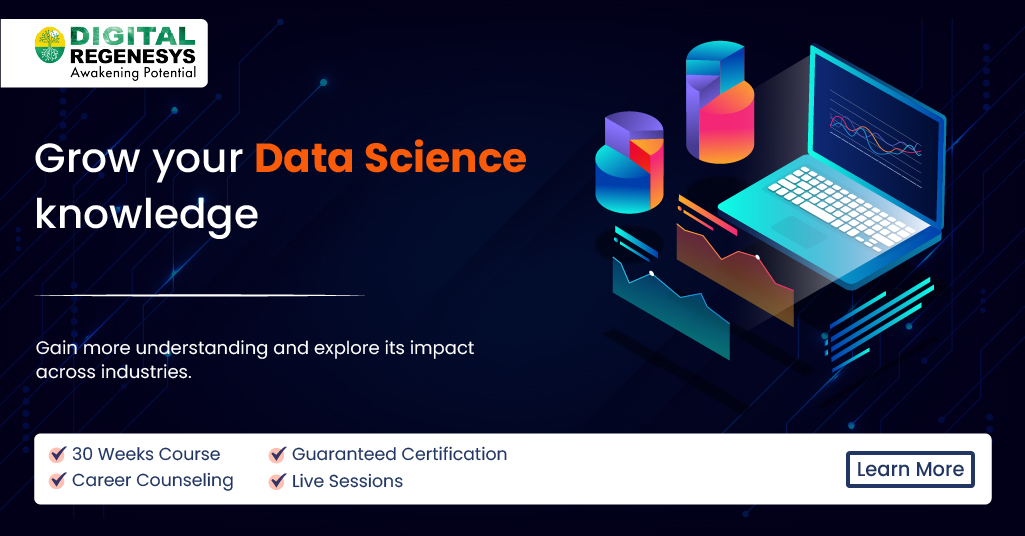Skills To Learn To Become A Data Scientist- Develop Skills with Digital Regenesys

Data scientists analyse and interpret complex data to help businesses make better decisions. They use programming, statistics, and machine learning to find data patterns. The role requires proficiency in Python, R, SQL, and large data technologies. The Data science field offers diverse industry opportunities, including tech, finance, healthcare, and retail.
You need to learn several essential skills to become a data scientist. Start with programming languages like Python and R. Learn statistics, data patterns, data manipulation and the use of libraries like Pandas. These skills are essential for data analysis and interpretation. Learn how to use data tools like Hadoop and Spark. In this article, you will learn essential skills for data scientists (both technical and non-technical) and the Digital Regenesys Data Science Course.
Essential Technical Skills Required for Data Scientists
In the rapidly growing data science field, specific technical skills are required for data scientists’ success. They must learn various tools and techniques to analyse and interpret data effectively. Here are some essential technical skills every data scientist should know about.
1. Data Visualisation
In Data visualisation, scientists use Tableau, Power BI, and Seaborn to turn complex data into actionable insights. It includes creating charts, graphs, and dashboards to make data understandable for both technical and non-technical audiences. This skill is essential for identifying trends and making data-driven decisions.
2. Machine Learning
Machine learning helps data scientists build predictive models and algorithms with frameworks like TensorFlow, PyTorch, and Scikit-Learn. This skill helps to discover patterns, predict results, and automate decisions. Machine learning also helps to improve data-driven business strategies.
3. Programming
Programming helps data scientists to handle data, implement algorithms, and automate programs. Some examples of programming languages are Python, R, and SQL. These are used for data analysis, statistical modelling, and database management. Strong programming skills allow data scientists to work with large datasets, create custom solutions, and integrate various data processing tools. This also enhances effectiveness and productivity in data-driven projects.
4. Probability and Statistics
As a Data Scientist, you must know probability and statistics. It helps to analyse data accurately and make better decisions. This skill includes statistical tests, distributions, likelihoods, and concepts like hypothesis testing, regression analysis, and Bayesian inference. Probability and statistics help data scientists interpret data correctly, validate models, and measure the certainty of predictions.
5. Deep Learning
Deep learning is a part of machine learning that focuses on neural networks with many layers. It helps to solve complex problems like image and speech recognition, natural language processing, and autonomous systems. Deep learning includes frameworks like TensorFlow and PyTorch to create, prepare, and optimise neural networks. This skill allows data scientists to create sophisticated models to handle large amounts of data. It helps develop AI and provide innovative solutions in various fields.
Non-Technical Skills Required For Data Scientists
Along with technical skills, non-technical skills are also essential for data scientists. These skills help them communicate effectively, solve problems creatively, and work skillfully with others. Here are some non-technical skills that every data scientist should maintain.
1. Communication
Data scientists must have communication skills to explain their findings clearly to both technical and non-technical audiences. This includes writing reports, creating presentations, and speaking effectively to ensure everyone understands the data insights and recommendations.
2. Problem-Solving
Problem-solving skills allow data scientists to identify issues, analyse them, and find practical, effective solutions. This skill helps them tackle complex data challenges and develop innovative ways to solve business problems.
3. Collaboration
Collaboration means working politely with team members and others from different departments. Data scientists must share ideas, discuss problems, and work together to achieve common goals, making teamwork a critical part of their job.
4. Business Acumen
Business acumen is the ability to understand how businesses operate and make finances.
Data scientists with this skill ensure their data analysis matches the company’s goals and achieves the targets.
5. Attention to Detail
Attention to detail means being careful when analysing data and checking errors. This skill ensures that data scientists produce accurate and reliable results, which is essential for making better decisions.

Develop Your Data Scientist Skills With Digital Regenesys Data Science Course
Digital Regenesys offers a comprehensive 30-week Data Science Course. In the course, students will gain proficiency in programming languages such as Python and R. They will learn to use tools like Spark NLP, GIT, and GitHub to manipulate and analyse large datasets. The curriculum includes modules on data visualisation with Power BI and Tableau, database management with MySQL and MongoDB, and advanced data analysis techniques. The course also offers live classes, international certification, and career counselling from industry-expert faculty. The course is available online for students in the USA, South Africa, Nigeria, Kenya, Uganda, Tanzania, and India. Enrol the course now and enhance your career with globally recognised certification.
A data scientist needs both technical and non-technical skills. Learning programming languages like Python and R data visualisation tools are essential. Additionally, skills like communication and problem-solving are necessary. Digital Regenesys offers a comprehensive course to help you develop these skills and succeed in the data science field. Enrol in the Digital Regenesys’ Data Science course to enhance your career with a globally recognised certification.
Last Updated: 1 September 2025